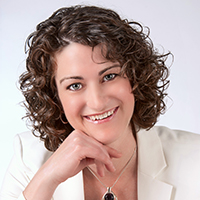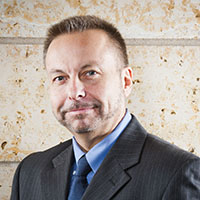The University of St. Thomas College of Education, Leadership and Counseling (CELC) offers graduate degrees in counseling and therapy, as well as an executive coaching certificate – a twelve-month program now entering its second year. The program is a collaboration between CELC's Graduate School of Professional Psychology and Organization Learning and Development Department. Here Stacey Larsen, Ed.D., executive coaching program director, and Christopher Vye, Ph.D., chair of the Graduate School of Professional Psychology, discuss the differences between the fields of coaching and therapy, and how St. Thomas is uniquely positioned with the combination of these two programs.
What is the difference between counseling and coaching?
SL: When we talk about the difference between counseling and coaching, in general, there’s a big overlap between the two. Both therapists and coaches are going to be asking really good questions of their “clients.” They’re asking them to be introspective, to reflect on things, and look inside themselves.
I think the difference between a coach and a therapist -- though this doesn’t apply to everyone -- is that a coach is simultaneously helping their client develop new awareness and helping their client move forward to take action. Certain kinds of therapy are about insight and healing, and not necessarily action-oriented.
CV: I would agree – it’s important to note that there is a lot of overlap. Certainly therapy can be goal-directed and action-oriented, though often times these goals and actions are remedial in nature. The area of focus is more often dysfunction, emotional crisis or mental health.
SL: The appeal to some therapists of adding coaching to one’s repertoire is that a coach views a client as whole and capable – they have everything they need to be successful, and that’s where we start. Therapists also add coaching practices to meet the needs and assumptions of their clients. Actually, there are some folks in the coaching field who believe that the best coaches on the planet are those with a psychology background.
CV: There is quite a bit of overlap, actually. For example, positive psychology has had a big impact on the coaching field
SL: There are different varieties of coaching. There is life coaching, which is geared toward individuals who are strengthening a work/life balance, or family relationships. This is closer to therapy. St. Thomas' coaching certificate, on the other hand, focuses on “executive coaching,” which means it’s grounded in the workplace. The students we’re training will be seeing clients who are managers, directors, organization leaders, etc. The topics these coaching clients wrestle with are leadership-type issues. Executive coaching offers an opportunity to help leaders in organizations grow and enhance their leadership effectiveness. And UST has both a counseling degree and a coaching certificate, which is unique. A student could choose one or the other based on the type of client they are looking to serve or the context of the client’s difficulties.
CV: Right. Someone who might want to work in counseling might say ‘I want to work with issues of trauma, anxiety, depression and family issues,’ for instance. These issues may manifest themselves in the workplace, but also in other contexts.
SL: And they might choose coaching, on the other hand, if they want to work with leaders in organizations and help them become more effective, and have better workplace relationships and teams. Or you could have someone with a counseling degree who wants to add coaching to make themselves more marketable.
CV: They are very different programs in terms of requirements. The coaching certificate is really for people who have experience working in organizations, and so far, the vast majority of those students have a master’s degree already – most often in the human resources or business area. Whereas many counseling students are coming right out of their bachelor’s degree. So in a way, coaching students are generally a bit further academically, and typically have more experience as well. So the coaching certificate wouldn’t be appropriate for a post-bachelor’s student, unless they had quite a bit of organizational experience. Even after a master’s degree in counseling, organizational experience is important if they want to add a coaching certificate. Knowledge of business operations helps give coaches credibility. There’s also a need for counselors and therapists in large companies in employee assistant programs, and beginning as a therapist in such companies a counselor and learn a lot about organizations.
How do these two subfields interact and coexist in practice?
SL: We really try to help our students understand very clearly when a coach should refer a client to a consultant, or a therapist, or a counselor, versus when coaching is appropriate. To maintain these boundaries is very important for both coaches and counselors. So this conversation we’re having is really important because everyone needs to know what these services are, and we need to educate clients on what their options are, and what is best for them.
CV: There have been tensions at times between these two fields, which I think is the result of programs that may not provide good training regarding this boundary and the need to refer clients in the appropriate situations. This is a strength of our program, and there’s more to be done on both sides. Coaches may not always know when to refer, and in our program we teach students how to readily seek consultation when questions arise about whether counseling or therapy is appropriate.
What would you advise a prospective student who is not sure which program would be best for them?
SL: The student who would be a good candidate for the coaching certificate would be someone who gets excited about discussing the issues and challenges within organizations. They would be someone who has spent time in organizations, either as a consultant or therapist, and has a passion for making leadership and communication more effective. They want to address issues like work/life balance, for instance, and they want to make a difference in these areas. That would be the person who would go into coaching, because they want to help people address those issues, for themselves as leaders, or within teams. A good candidate would also be someone interested in positive psychology, and would want to use that in the workplace. These are the kinds of people who love doing assessments like the Myers-Briggs, or doing 360 interpretations. But they don’t just want to do the assessment – they want to work with the person and watch them evolve.
CV: In contrast, the students who would pursue a counseling or therapy degree would be passionate about helping people from disadvantaged circumstances – people who have experienced trauma, or have an emotional crisis, or are struggling with mental health problems. When we read the statements that applicants write for us, that’s what they’re talking about. There tends to be more focus on personal issues, on people with substantial stress and marital or family problems.
You just launched this program – why was this a good time to launch the program and why is it so relevant today? What have you learned in the first year?
CV: Well, coaching is a rapidly expanding field. We did a market study, and it appeared that there was an interest in the local community for an executive coaching certificate. And there aren’t any other local, university-based executive coaching certificates. We think we’re uniquely positioned with a partnership between these two units that each area brings something to the table. This is rare in coaching programs across the country – the combination of professional psychology and organization, learning and development. Since we train both therapists and coaches at UST, we have a unique perspective.
SL: Our program is really continuing to grow, and we’ve received a lot of positive feedback. We want to try to get a more consistent schedule that is outside of the work day, so it shouldn’t be an issue for people who work full-time. We also want to grow our coaching community: there are going to be quarterly activities for alumni and prospective students, either online or in person, starting in the fall. We want to promote ongoing learning for those within the program as well as other programs, so we can continue to have a practitioner/scholar conversation here in the Twin Cities.









